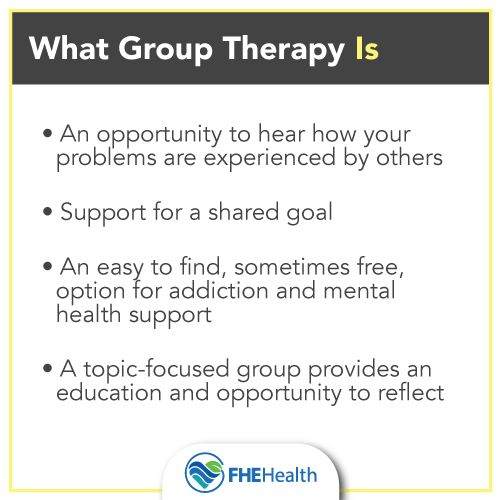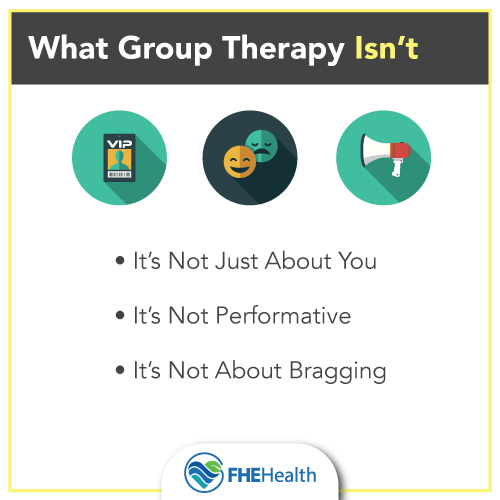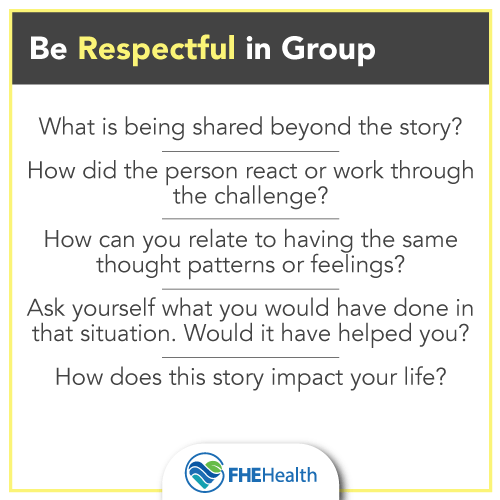
In a group setting, you come together with others who understand your problems and know what you are experiencing. You can benefit most from group therapy and feel comfortable getting the help you need if you put time and effort into the process.
The Advantages of Group Therapy
 Group therapy is a popular source of help. Offered in many formats by various organizations and agencies, group therapy is commonly used for drug and alcohol addiction as well as mental health treatment. What makes it so popular is that the support group format is easy to set up to provide good-quality, real-life information to those who need it when they need it.
Group therapy is a popular source of help. Offered in many formats by various organizations and agencies, group therapy is commonly used for drug and alcohol addiction as well as mental health treatment. What makes it so popular is that the support group format is easy to set up to provide good-quality, real-life information to those who need it when they need it.
The National Institutes on Drug Abuse notes that group therapy, when combined with individual therapy, not only helps in those moments of need, it helps people maintain abstinence. To get the advantages of group therapy for yourself, you need to learn how to make the most of it.
It’s Not Just About Telling Your Story
 Many people battling addiction shy away from group therapy. It may seem overwhelming or embarrassing. Some people don’t feel they can talk in front of a group or share painful memories.
Many people battling addiction shy away from group therapy. It may seem overwhelming or embarrassing. Some people don’t feel they can talk in front of a group or share painful memories.
Luckily, there is no need to speak up at all. Listening provides the foundation of success for many people who attend group therapy, especially initially.
It’s possible that in a group setting like this, you can get by without saying anything. In some cases, you may just say your name and then let everyone else know that you are there to listen and learn. No one will force you to share.
Listening is a type of interpersonal learning. Sometimes, the very best benefit of attending group therapy is that it lets you learn from others. Listening to other people’s stories is an excellent educational tool.
Perhaps what is most powerful is that you will likely see patterns and similarities in what happened to others and what happened to you. That link with another person’s experience can be valuable.
Recognizing these patterns in others facing addiction helps you realize you are not in this alone. It can also provide you with insight into what could help you get through the current situation you are trying to manage. In group therapy, you gain this benefit just by sitting down and listening to others.
It’s Not Performative
For people who think that sharing means they have to put on a great performance or share a deep revelation, group therapy is intimidating. They may not think they have anything to share.
Some don’t believe they can command an audience well enough. Again, you simply don’t have to do this.
Rather, stepping up and sharing your story is all you need to do. Speak as if you were talking to a friend. By this simple action, you may help another person get the support they need in that moment.
It’s Not About Boasting
The other side of the story is also true. You shouldn’t go into a group therapy session to brag about your success. It’s not the place to look for accolades or to boast about your life.
It doesn’t matter if you want to impress others with how bad or how good your life was; it’s best to refocus your efforts here. If anything you say could hurt or hinder another person, don’t say it.
Rather, view group therapy as a time for you to provide information, get support and work on your own issues. View the simple act of sharing as the benefit.
Don’t seek attention in group therapy sessions. That’s not going to provide you with the best support for your sobriety.
Be Respectful
 Learning how to act in group therapy may sound challenging at this point. Should you share? Could you overshare? The best way to look at the process is to see it as an opportunity for you to be respectful.
Learning how to act in group therapy may sound challenging at this point. Should you share? Could you overshare? The best way to look at the process is to see it as an opportunity for you to be respectful.
In these settings, many people share their deepest secrets and their darkest thoughts. They need to do this to express themselves and get help. For group therapy to be effective, it has to be a sacred place where such thoughts can be shared safely.
In some of these situations, you may not feel there’s anything for you to learn. Their story may be pretty boring or may not relate at all to what you are going through. That’s okay. Look harder for an opportunity to learn from it.
- What is being shared beyond the story?
- How did the person react or work through the challenge?
- How can you relate to having the same thought patterns or feelings?
- Ask yourself what you would have done in that situation. Would it have helped you?
- How does this story impact your life?
Find ways to connect with each story. When you do so, you are getting the most out of group therapy.
Be Willing to Embrace Help
In some group therapy sessions, you may have an opportunity to speak to others within that group after the meeting. Or in other moments, a moderator or therapist may step in to offer help. Be willing to open up enough to get that help.
If it’s just not possible or too painful, let them know. However, when you allow others to move into your space like this, you’ll find you get far more out of the sessions.
How Group Therapy Sessions Flow and What You Can Expect
Learning how to run group therapy isn’t done by reading a manual. Every organization or provider hosting one will do so differently. The topics may range from week to week.
Some follow a very specific pattern of discussing risks, day-to-day life, struggles related to relapse and relationships. Many times, groups have a particular topic focus, such as the 12-Step Program’s steps.
Because there is so much variety, from a locally run AA group to a therapist-led group in a facility, it’s hard to know what to expect. But most group therapy sessions have a few key similarities:
- They welcome everyone. It’s a judgment-free zone.
- They encourage individuals to talk, usually about anything they need to discuss.
- There is generally time to meet others afterward, though you never have to do so.
- Most group sessions don’t call anyone out, but they do welcome your input and sharing.
- Most provide information in advance about what’s likely to happen during the meeting or what you can expect. Contact the location to find out what you want to know.
Don’t fear a group therapy session. Instead, see the advantages group therapy can offer to your life. There is much to learn from what’s happening to others on the path to addiction recovery.






